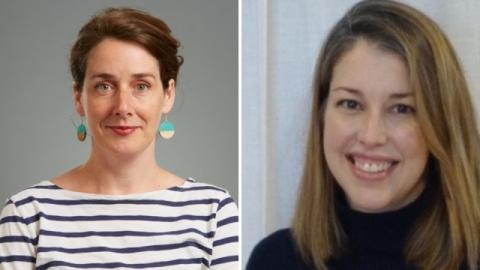Faculty at Home: Florence Feiereisen and Erin Sassin
–
Virtual Middlebury
Please join Florence Feiereisen, Professor of German, and Erin Sassin, Associate Professor of History of Art & Architecture, for a talk entitled “Rendering the Past Audible: Acoustic Ecology, Space and History.”
Hearing is an integral part of our perception of the world, a “lens” through which society, both past and present, can be investigated. In this talk, we showcase our collaborative research at the intersection of acoustic ecology, urban studies, architectural history, and German studies.
Acoustic ecology, as defined by Canadian composer and soundscape pioneer R. Murray Schafer, is “the study of sounds in relationship to life and society.” We ask: How do sounds shape social dynamics and the built environment? By applying this framework to architecture and urban space, we explore how listening to history uncovers layers of lived experience often overlooked by visual analysis alone.
We demonstrate this through three case studies from Germany’s past. Our first study explores the sonic heritage of Meyershof, a massive tenement in Berlin-Wedding. By reconstructing the sounds of the street, as well as communal and domestic spaces within this “city within a city” in 1932, we sought to capture the auditory experiences of residents and workers only one year before the advent of the Third Reich. In our second case study, we examine the soundscapes of the Western Front during World War I. In the trenches, auditory vigilance was critical, as soldiers learned to distinguish between the sounds of danger and safety. This exposure to wartime sounds left lasting impacts on interwar society that echoed through technological advances for the hearing impaired and the psychological trauma of shell shock. Our third case study addresses the impact of gentrification on the formerly working-class district of Berlin-Prenzlauer Berg. Our approach reveals how the interplay of visual and sonic elements shape class dynamics within gentrifying neighborhoods.
By prioritizing sound, our shared work de-emphasizes persistent visual biases in the study of the built environment. In recording a fuller, multisensory experience of the past, we hope to reinscribe marginalized voices in the historical record.
Florence Feiereisen is professor of German at Middlebury. She studied German and computational linguistics at the University of Heidelberg in Germany (MA 2003) and received a PhD in German cultural studies from the University of Massachusetts Amherst in 2007 before joining the Middlebury faculty that same year. Florence teaches language classes as well as upper-level courses focusing on German history, national identity, gender, linguistics, and sound.
She has published various books and articles in the fields of contemporary literature, sociolinguistics, and acoustic ecology/sound studies. Of note in the context of this talk is the coedited volume Germany in the Loud Twentieth Century (Oxford University Press, 2012; with Alexandra Hill). Her current research is situated at the intersection of urban history (Berlin!), architecture, and acoustic ecology. Florence and Erin’s latest publication is an article in Resonance: The Journal of Sound and Culture titled “Sounding Out the Symptoms of Gentrification in Berlin.”
Erin Eckhold Sassin is associate professor of the history of art and architecture at Middlebury, where she teaches modern architectural history and theory. She received her PhD in the history of art and architecture from Brown University in 2012. Her research is closely linked to her teaching interests: she has published articles on gender and design, the intersection of architecture, power, and ethnicity on the borders of the German Empire, and the impacts of conflict on design work, as well as on acoustic ecology and the built environment. Her 2020 book, Single People and Mass Housing in Germany (1850–1930)—(No) Home Away from Home, was awarded a 2019 fellowship from the Graham Foundation for Advanced Studies in the Fine Arts. Her 2022 coedited volume, States of Emergency: Architecture, Urbanism, and the First World War, helped inform her most recent exhibition at Middlebury; she worked with Special Collections, colleague Sarah Rogers, and their students to curate WWI: Here and There (winter 2023). With her students, Erin has also curated two exhibitions at the MCMA: Bloom and Doom: Vienna 1900 (fall 2016) and Weimar, Dessau, Berlin: the Bauhaus as School and Laboratory (winter 2020).
Register here.
Sponsored by Faculty at Home.
- Sponsored by:
- Alumni & Parent Programs
- Sponsor URL:
- https://www.middlebury.edu/provost/faculty-home
- Related URL:
- https://www.middlebury.edu/provost/faculty-home
Contact Organizer
Anda, Maureen
manda@middlebury.edu

